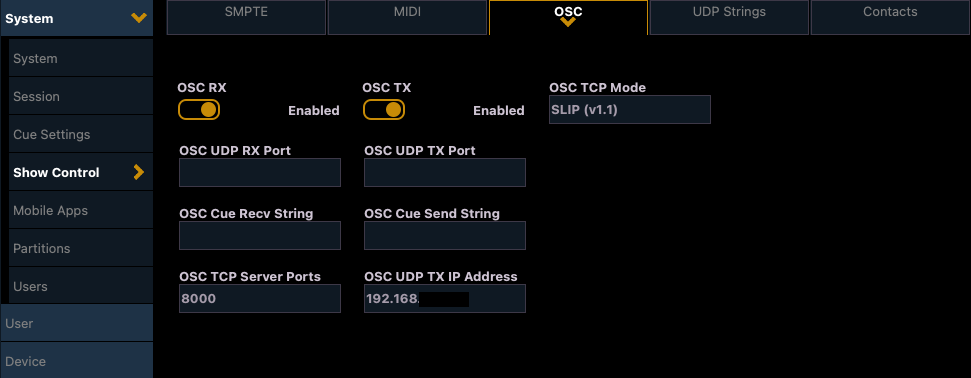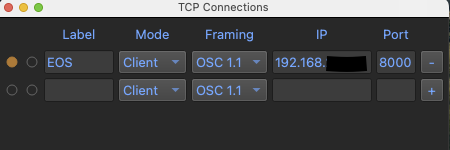Missed OSC triggers
Brendan Aanes
I have a show running in which all Qlab cues are triggered over OSC
from ETC Eos software running on a windows laptop. Since we began
performances a few days ago, 1-3 sound cues in each performance have
failed to trigger (out of around 70 cues). It's usually been different
cues each time, but sometimes the same cue will fail in two
performances but then work fine in the following. It doesn't seem
related to time between cues, as it's not usually the first cue in a
sequence that fails.
Qlab system is a 2020 Macbook Pro (intel) running Qlab 4.7 in MacOS Ventura.
The network is very simple - it's now just the two computers connected
directly without any switch in between, set to static IPs in the same
subnet. The qlab computer has no other network adapters attached and
Wifi is off. The static IPs are in a different subnet than the IPs
used for the lighting network. The LX team's response when this
started was "oh OSC just sometimes fails" which I don't think is a
satisfactory solution.
Any ideas what to look for to sort this out? It's been ages since I
did a system where an ETC console triggered Qlab over anything but
MSC, but I have done a number of shows with Qlab triggering other Qlab
systems or ETC hardware via OSC and those have all been 100% reliable
or very close.
Richard Williamson
I fixed it by using oscRouter from ETC to create a tcp connection between the mac and the console, and then forward the messages to qlab. There is also a possibility that using eos’s osc filter methods may help but I haven’t tried this yet
Richard
Sent from my iPhone
> On 27 Feb 2023, at 08:08, Brendan Aanes <baa...@gmail.com> wrote:
>
> Hi all,
> Contact support anytime: sup...@figure53.com
> Follow QLab on Twitter: https://twitter.com/QLabApp
> User Group Code of Conduct: https://qlab.app/code-of-conduct/
> ---
> You received this message because you are subscribed to the Google Groups "QLab" group.
> To unsubscribe from this group and stop receiving emails from it, send an email to qlab+uns...@googlegroups.com.
> To view this discussion on the web visit https://groups.google.com/d/msgid/qlab/CAE3XBDT-%3D%2BkCVXviGuaFaHU3b9WwZXyUwMxZwtmi7xEn2c5Urg%40mail.gmail.com.
Kyle Jensen
Brendan Aanes
To view this discussion on the web visit https://groups.google.com/d/msgid/qlab/CAD1j_adSP_hTpfxG5WYDG_RNP37a6-QczA8XXi1nR8L8qM85%2Bw%40mail.gmail.com.
Sam Kusnetz
To view this discussion on the web visit https://groups.google.com/d/msgid/qlab/CAE3XBDSq_JxmwPtJdhwC__2iZeEnYkiyPstvdd9sF3qrYSEdAQ%40mail.gmail.com.
Andrew Nelson
set IPADDRESS=192.168.100.101
set INTERVAL=10
:PINGINTERVAL
ping %IPADDRESS% -n 1 > nul
timeout %INTERVAL%
GOTO PINGINTERVAL
sstaub
Chris Ashworth

Andy Kanturek



On Jan 22, 2024, at 9:48 AM, Chris Ashworth <ch...@figure53.com> wrote:
Hi Stefan,QLab does support outgoing TCPOf course the receiving server must also accept TCP connections for this to work-C
<Screen Shot 2024-01-22 at 10.47.19 AM.png>
On January 22, 2024 at 9:56:55 AM, sstaub (stefan...@lichtkunst-kunstlicht.de) wrote:
The main problem is that EOS and QLab act as a TCP Server. I made a feature request for EOS to implement a TCP Client.This will also helpful on QLab to implement additional a TCP Client.Sometimes the Ethernet cables can have defects. Personal, I never had a problem with UDP.It is meanwhile possible to run the EOS and QLab application on the same laptop using the loopback address 127.0.0.1
Follow QLab on Threads: https://threads.net/@QLabApp
User Group Code of Conduct: https://qlab.app/code-of-conduct/
---
You received this message because you are subscribed to the Google Groups "QLab" group.
To unsubscribe from this group and stop receiving emails from it, send an email to qlab+uns...@googlegroups.com.
To view this discussion on the web visit https://groups.google.com/d/msgid/qlab/CADv1a49yQVebxfL0JZA6t%2BoWxRZ9V%3DFcHp5yMAfO4-0n45JHrQ%40mail.gmail.com.
Andrew Nelson
Short version: Filters plus custom string OSC messages are great.
Gory details if interested:
I recently had great success with the Eos filters. We send these OSC messages to the LX console:
- Filter only QLab cues:
- /eos/filter/add /cue/*
- Filter only EOS ‘fire’ cues:
- /eos/filter/add /eos/out/event/*
They both worked and brought down the number of outbound OSC messages from LX to 2 - the standard Eos message and the custom string (QLab OSC).
However, we observed 100% success with the QLab OSC and only about 75% with the Eos messages. In the past with no custom string and no filter we’ve dropped 1-3 messages in 150.
Looking at network traffic with only 1 outgoing message and no filter:
Each cue sends around 10 or more OSC messages (fire is first).
On dropped messages, the first 4-6 messages are missing.
Looking at network traffic with 2 outgoing messages and no filter:
Eos cue sends around 10 or more OSC messages (fire is first).
One message is sent next in the custom string format.
Missed 1% of Eos messages, and 1 of 300 custom cues
Looking at network traffic with 2 outgoing messages and filters applied:
Each cue sends 2 OSC messages - 1st Eos standard, 2nd custom string
On dropped messages, the Eos message is missing, but the custom string is seen.
Missed ~75% of Eos messages, 0% of custom string
We had a case recently where we need to trigger QLab and a caption system (UDP only) from LX. Once I changed the caption system to listen for the QLab-style OSC messages, we started receiving 100% of our cues. Makes me think this is why using the custom string for QLab often works great, and if the filter is applied, it works perfectly.
Not knowing for sure what effect reapplying a filter has (2-show days), we start by using a clear filter message followed by the filter messages for every show.
/eos/filter/clear
1 sec delay
/eos/filter/add /cue/*
/eos/filter/add /eos/out/event/*
